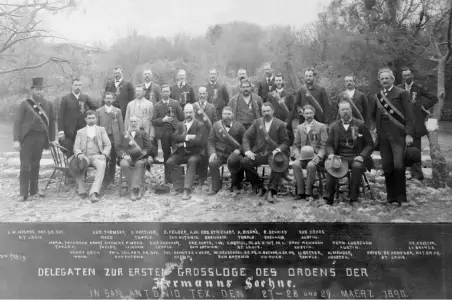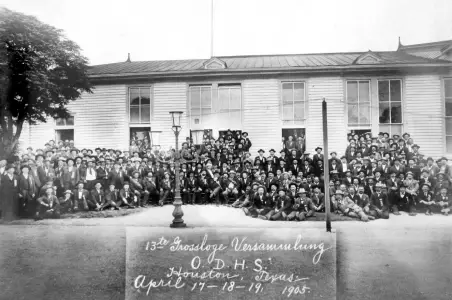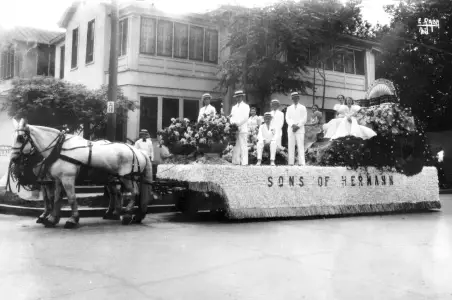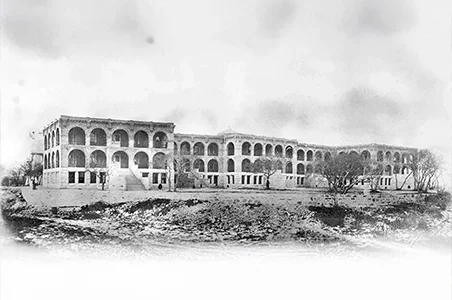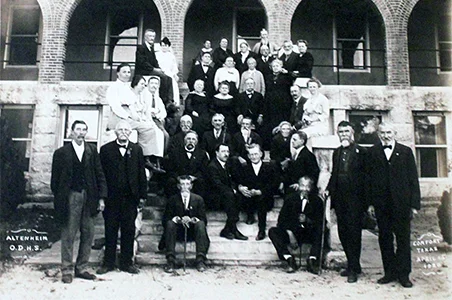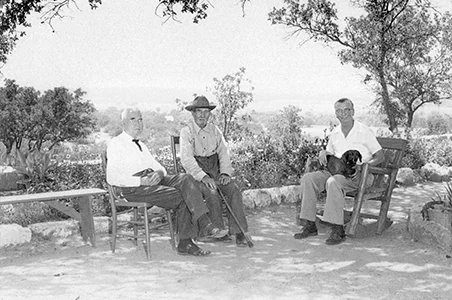
Our History
The history of Hermann Sons Life can be traced back to 1840. It was July 20 of that year that a group of men of German descent came together in New York City and founded Der Orden der Hermann Soehne (The Order of the Sons of Hermann). Its purpose was to provide mutual aid and promote the preservation of the German language and traditions.
1860
The Hermann Sons movement came to Texas in 1860 when two members, John Lemnitzer and Jakob Goll, moved to San Antonio.
They assembled several German speaking citizens of the Alamo City on New Year’s Day in 1860 and talked about Hermann Sons. The group voted to organize a lodge, and on July 6, 1861, the first Sons of Hermann Lodge in Texas was founded as San Antonio Harmonia Lodge of the Order of the Sons of Hermann. The lodge exists to this day.
Judging from early meeting minutes, the pioneers of Harmonia Lodge organized as a brotherhood to be of assistance to each other.
Only three months after the lodge formed, one of the original members passed away. Eleven members of the lodge attended the funeral in a group. Harmonia Lodge paid for both the coffin and the grave at a cost of $24. Records indicate the widow received assistance from the lodge for a considerable time.
1873
It was during a Harmonia Lodge meeting on Dec. 18, 1873, that connecting life insurance to lodge membership was first suggested.
Harmonia Lodge asked the National Grand Lodge to institute a life insurance program and make the insurance obligatory for all members. The National Grand Lodge adopted the recommendation and announced on Sept. 22, 1876, that each brother would be entitled to $300 life insurance and $60 at the death of his wife. In promoting this national project, Harmonia Lodge and Texas gained national stature.
1890
On Feb. 2, 1890, almost three decades after the founding of Harmonia Lodge No. 1, the second lodge, Eintracht Lodge No. 2, was established in Austin.
Within the next two months, lodges were organized in Taylor, Waco, Temple, Brenham, Houston and La Grange, bringing the total number of lodges in the state to eight and total membership to 242.
The National Order recognized the formation of a State Grand Lodge when at least eight lodges existed in any state. So, on March 27, 1890, the Grand Lodge of Texas of the Sons of Hermann was founded. Some 92 Hermann Sons lodges were established in communities throughout Texas during the ensuing year.
The organization was named in honor of German national hero, Hermann the Cherusker. Hermann, also known by the name of Arminius, was the son of a Germanic Cheruscan chief.
Now
After more than 160 years,
Hermann Sons Life has active lodges throughout the State of Texas and is very proud to remain active in Texas communities while continuing to provide life insurance protection for families.
Retirement Home History
It was during the Grand Lodge Convention in Austin on April 21-23, 1913, that Grand Secretary John Windlinger made the recommendation to build a retirement home to provide security and community for the elderly members. It is believed this was the first time that any fraternal group had proposed such a project. It would be called the Alten und Waisenheim (elder and orphan home).
The resolution was adopted and a committee of 10 members was appointed to select a site. After looking at places in La Grange, San Marcos, San Antonio, Fredericksburg, Austin and Boerne, the committee chose 202 acres on a hilltop near Comfort overlooking the Guadalupe River.
The Hermann Sons lodges and citizens of Comfort donated $7,000 of the $9,000 cost. Arthur J. Herman was the architect who designed the castle-like masonry building and the contract was awarded Jan. 22, 1915, to H.R. Jones Construction Co. for a sum of $54,675.
A formal dedication of the Home was held Thursday, May 11, 1916.
The Alten und Waisenheim would only be offered to orphans for a few years and then would simply be known as the Altenheim. When the English language became more widely used it was referred to as the Home for the Aged and presently is known as the Hermann Sons Life Retirement Home.
Our retirement home has been a place of cherished memories for 108 years, providing a warm and welcoming community for generations of Hermann Sons Life members. Our commitment remains to honor its legacy while exploring options for the future.
